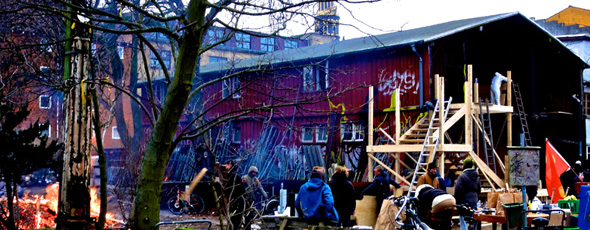
It is the 41st birthday of Christiania, and spirits are high. Visitors from all over Denmark and abroad crowd around the stalls on Pusher Street, in front of artistically graffitied walls and around oil barrels, buying their evening’s smoke before flocking to one of the many venues and bars. The Christianites themselves are inconspicuous, as the 900 people strong commune is overwhelmed by a flood of thousands of sympathisers.
Despite what you might have heard several times in the past few years, Christiania is still open.
More than a year has passed since Christiania had to choose between the three options the Danish state offered: buying the buildings they have used for decades as a community; buying them as a collective; or having its inhabitants, including numerous children and elderly people, face eviction by force.
Not the most befitting choice to offer a hippy commune which occupied an old military area in the midst of the ’70s Danish housing crisis, to renovate and construct unique DIY buildings. But after years of heavy police presence and fruitless legal battles, Christiania saw a new agreement with the state as the only option. And the Danish state figured that setting up the situation so that buying would be the only feasible option, could potentially split the community and crush its soul.
It’s also been more than a year since Thomas Ertmann left his role as official press representative and went back to being just another Christianite. We take a walk along the natural park lying just behind Christiania’s centre, under the yellowing trees, and talk about the old times and the new.
The atmosphere in the Freetown had been heavy for years since the right-wing government, led by Anders Fogh-Rasmussen who held prime ministerial power for ten years, tackled the Christiania question by focusing – in legislation and in the media – only on the hash market in Pusher Street.
“There was hardly ever any mention of the fact that Christiania was born from the takeover of an abandoned area which, unlike most squatted spaces, had not been locked down but opened up to the outside world,” remembers Thomas. “And there certainly wasn’t any mention of the important social function that Christiania performs daily, by being a haven for homeless, mentally ill and resourceless people who would not be welcome anywhere else. In Christiania they are an accepted addition to the local community.”
In 2004, Christianites had already agreed upon the necessary conditions for a fair deal. One of their wishes was that Christiania’s original area would not be diminished, which was necessary in order to avoid speculation and to make sure the broad resourceless segment of its population could keep their homes. Market prices would have brought class-based social cleansing to the area, the opposite of the inclusiveness which Christiania stands for. Another important point was that Christiania should keep governing itself through neighbourhood meetings and common meetings, the tools of consensus-based direct democracy.
The stalemate ended in 2011, when Christiania agreed to buy the grounds as a fund, effectively implementing collective property. “The mood was of great relief and great confusion,” says Thomas. “People felt relieved that their fate no longer depended on politicians, but at the same time the situation was new and extremely complex.”
Even as Christiania accepted dialogue with the state, it was not only ideology that made the deal tough to swallow. The price for the grounds was not based on market value, but was set at £8.5 million, a sum a squatter commune doesn’t carry in its back pocket. To raise the money, Christiania started printing ‘Christiania shares’, thank-you cards for whoever made offers. Today, the fund has gathered £1 million.
Thomas is positive about the future of Christiania. “My hopes are that Christiania will continue with its unique structure, and that its model will spread. Every city needs free spaces. I think Christiania’s crossbreed of DIY attitude and collectivism, which is present at all levels in our commune, is an ideal that has great prospects, because nobody stands alone and taking responsibility is encouraged.”
As we turn back towards the centre of Christiania, boxbikes (which were invented here) pass by as cats look on, slowing to avoid the kids who play in the middle of the street. People of all ages are drinking and smoking in groups and circles under the coloured lights of Pusher Street. Several languages other than Danish are spoken at every corner. The spirit is that of a vital international community, and the pace is the relaxed beat of community life.
At the root of all the political games that have been played on its grounds, there is a deliberate denial of what Christiania really is for its inhabitants and visitors, which goes far beyond hash joints and colourful antics.
Christiania offers a glimpse of an alternative way of life to industrialism and consumerism in the middle of one of Europe’s capitals. Christiania does not believe your right to a home should depend on your income. Christiania shares its emotional wealth with those judged unfit to participate in mainstream society. Christiania has taken up the challenge and the massive energy drain of governing itself, and after 41 years it is still standing strong.
Whatever revolutions will come in Christiania’s future, one thing is certain: we will all still be invited to dance.
By Erica Masserano




